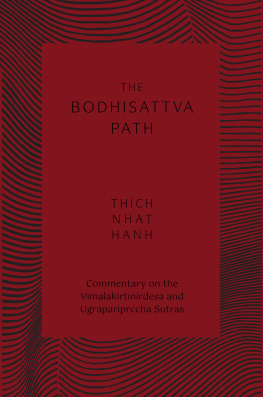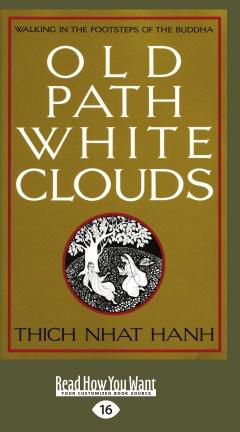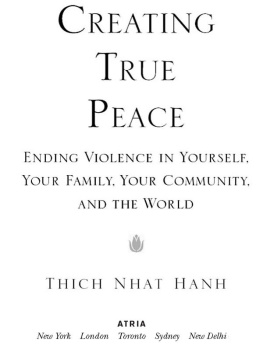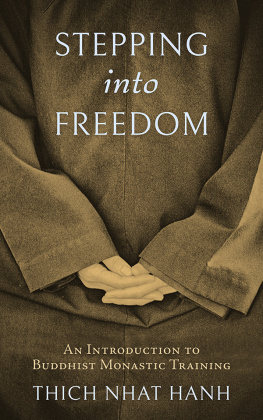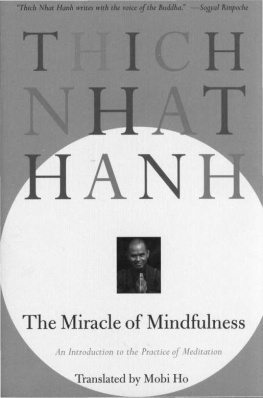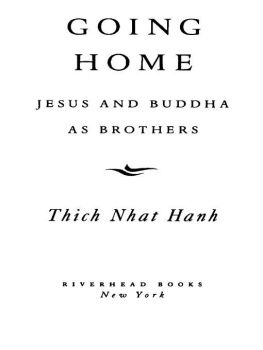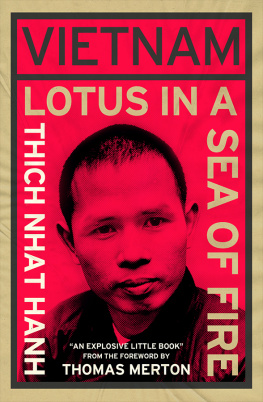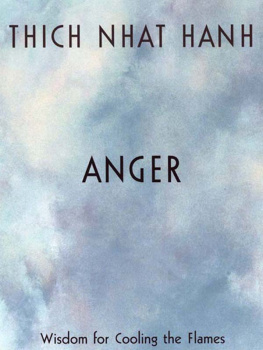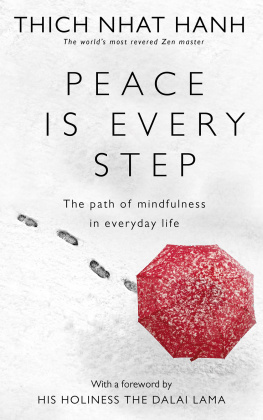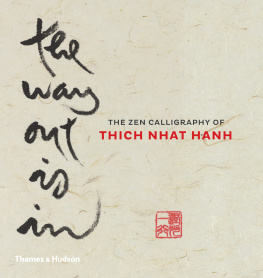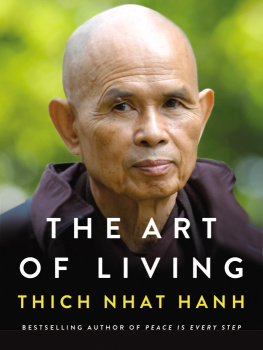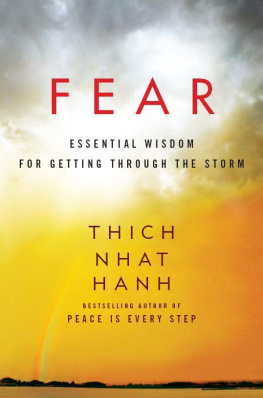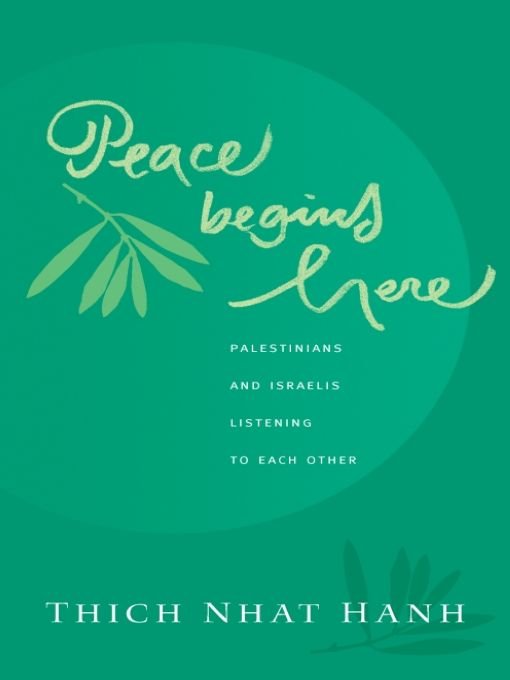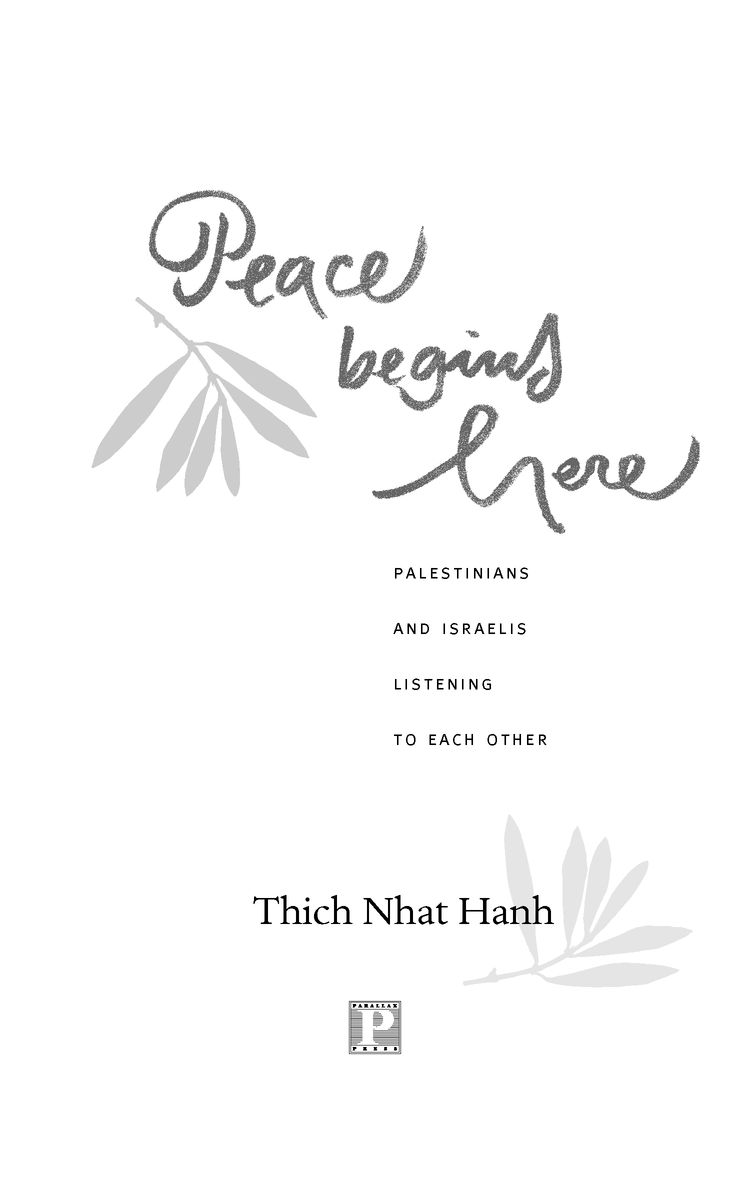Table of Contents
PARALLAX PRESS BOOKS BY THICH NHAT HANH
Be Free Where You Are
Being Peace
Breathe! You Are Alive: Sutra on the Full Awareness of Breathing
Call Me by My True Names: The Collected Poems of Thich Nhat Hanh
Cultivating the Mind of Love: The Practice of Looking Deeply in the Mahayana Buddhist Tradition
The Diamond That Cuts through Illusion: Commentaries on the Prajaparamita Diamond Sutra
Each Breath A Smile
Finding our True Home: Living in the Pure Land Here and Now
For a Future to Be Possible: Commentaries on the Five Mindfulness Trainings
Fragrant Palm Leaves: Journals 1962-1966
Freedom Wherever We Go: A Buddhist Monastic Code for the Twenty-first Century
Friends on the Path: Living Spiritual Communities
The Heart of the Buddhas Teaching: Transforming Suffering into Peace, Joy, and Liberation
The Heart of Understanding: Commentaries on the Prajaparamita Heart Sutra
The Hermit and the Well
Hermitage Among the Clouds: An Historical Novel of Fourteenth Century Vietnam
I Have Arrived, I Am Home
Interbeing: Fourteen Guidelines for Engaged Buddhism
Joyfully Together: The Art of Building a Harmonious Community
The Long Road Turns to Joy: A Guide to Walking Meditation
Love in Action: Writings on Nonviolent Social Change
Master Tang Hoi: First Zen Teacher in Vietnam & China
My Masters Robe: Memories of a Novice Monk
Old Path White Clouds: Walking in the Footsteps of the Buddha
Opening the Heart of the Cosmos: Insights on the Lotus Sutra
Our Appointment with Life: Discourse on Living Happily in the Present Moment
The Path of Emancipation
A Pebble for your Pocket
Plum Village Chanting and Recitation Book
Present Moment Wonderful Moment: Mindfulness Verses for Daily Living
A Rose for Your Pocket
Stepping into Freedom: An Introduction to Buddhist Monastic Training
The Stone Boy and Other Stories
The Sun My Heart: From Mindfulness to Insight Contemplation
Sutra on the Eight Realizations of the Great Beings
A Taste of Earth and Other Legends of Vietnam
Teachings on Love
Thundering Silence: Sutra on Knowing the Better Way to Catch a Snake
Touching Peace: Practicing the Art of Mindful Living
Touching the Earth: Intimate Conversations with the Buddha
Transformation and Healing: Sutra on the Four Establishments of Mindfulness
Transformation at the Base: Fifty Verses on the Nature of Consciousness
Under the Rose Apple Tree
Our Way Out is the Way In
Sister Thai Nghiem
IN 2001, in the hopes of helping heal the ongoing conflict, Thich Nhat Hanh called on his students in the Middle East to come together in Plum Village, France and begin two weeks meditation and mindfulness practice. The retreat inspired us to invite fifteen to thirty Palestinians and Israelis to come to Plum Village every year to be together, to listen to each other, and begin their own internal peace process.
I was privileged to be one of the first participants. Seeing how the practices offered in this book worked for me and for all of us as individuals and as groups, in spite of the difficulties, has strengthened my faith in the path of peace and freedom and inspired my decision to ordain as a nun. I now practice in Plum Village, while my Palestinian and Israeli friends continue to practice regularly together in the midst of the fire.
As a young nun, the most inspiring thing for me is to know that my real freedom is in my hands because I have a choice. We do not have to wait for anyone or anything in order to make the choice of living in peace and of living a life of understanding and love. If I want war to end, if I want nonviolence to be realized in my life, I am the one who has to stop fighting and put an end to the battle inside of me. Transforming my own mind is what will make the difference. Freedom depends on my own thoughts and actions. This is the kind of freedom that the practice of Plum Village is offering to us. Our way out, as Palestinians and Israelis, is the way in.
The Palestinian-Israeli groups who have come to Plum Village have been able to listen wholeheartedly, even when suffering is being shared, without judging and without commenting. In doing so, they have been able to create brotherhood and sisterhood, a true holy land in which our care for each other is revealed and we are able to nourish our compassion and understanding. It has been a challenging process. We have had to look in ourselves and embrace our pain and overcome suspicion.
Like everyone else on this earth, I long to have a home in which I feel safe. It is in human kindness, the kindness that is in me and in you, that I find this safety. That is my refuge and it is everywhere, even if sometimes it is hidden from my eyes. I am learning to touch it and cultivate it more and more in myself and in others. When I lose trust in myself and in others it is because I forget that this kindness is there.
For true transformation, we need to work not only on the individual level but on the collective one as well. Both the individual and the collective consciousness need healing. This may take a long time, and the effects of some of our actions will only be visible in the long run. Nevertheless, we can start doing something right now to stop the violence and to support others in doing so too. We can start by expressing clearly that no act of violence or oppression has ever brought peace or happiness to anyone, neither the oppressed nor the oppressor. We should not be afraid to take a clear stand. But if, while taking a clear stand, we find ourselves excluding any of our human brothers and sisterswhoever they may be and whatever party or nationality they may belong tothen we have already failed in our efforts to live in peace. No one should be excluded from our peace process.
The Palestinian and Israeli friends that have practiced in Plum Village were not alone in their process of individual and collective healing. The international community played a significant role not only by bearing witness but also by practicing together with us and truly listening. Without the presence of the international community, the process would not be complete. We all carry the responsibility for the fire in the Middle East. As Israelis and Palestinians, individually and collectively, we should learn to take refuge in the help of the international community.
If we want to offer peace and space to others we need to cultivate them within ourselves first, because we cannot offer what we do not have. This book shares some insight into the roots of suffering as well as suggesting methods of returning to ourselves and of cultivating that inner peace. Palestinians and Israelis also share personal stories of how they have put those methods into practice and experienced their own transformation.
In this book, you will find inspiring words and practices for peace. Cultivating these practices will help you to bring light to exterior and interior places that are darkened with despair. It may also help you to reach out to others who may not have made their choice yet. May this book help inspire all of us to choose peace and to be peace.


